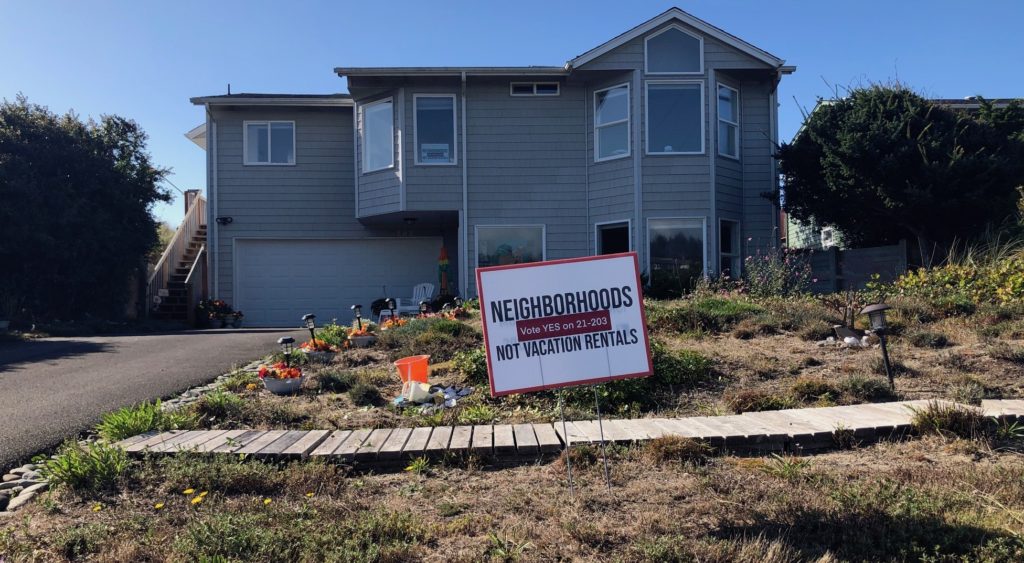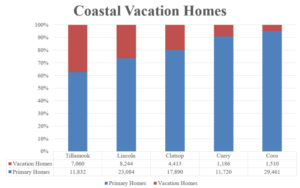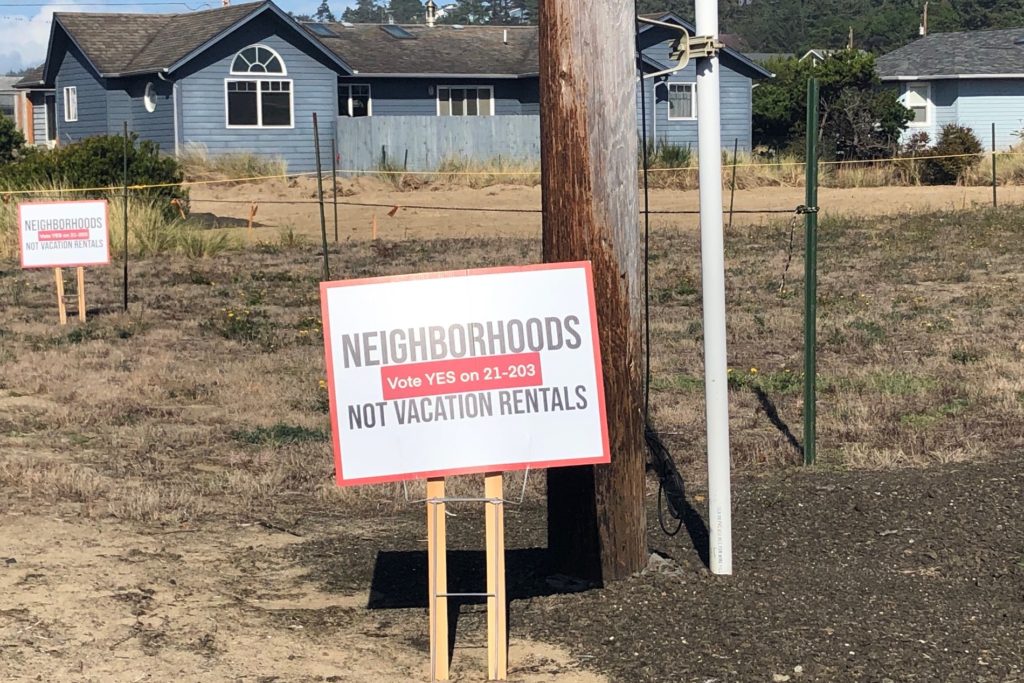
By QUINTON SMITH/YachatsNews.com
Two days after voters overwhelmingly approved a ballot measure phasing out vacation rentals in unincorporated neighborhoods of Lincoln County, discussion has started how to implement the new rules, the sheriff sent out notices warning license holders of the big changes, and a lodging company vowed to continue its opposition.
At the same time, the organization that put the initiative before voters said it hoped county commissioners would meet with them to discuss how to best put it into effect.

Voters approved Measure 21-203 on Tuesday by a 2,700-vote margin, 9,988 to 7,257, according to the Lincoln County elections department. That represents a vote of 58 percent to 42 percent.
The margin of victory surprised most people involved in the issue, given that it took the 15neighborhoods group months to gather the 1,400 signatures to qualify for the ballot and they were outspent 10-1 by two lodging groups opposed to the measure.
The result, backers said, indicated the dissatisfaction over the tripling of vacation rental numbers the past three years.
On Thursday, county staff was studying how to make the initiative work and the sheriff’s office warning it would no longer issue new licenses in residential zones and that current ones will expire within five years.
Monica Kirk, who spearheaded the initiative for the 15neighborhoods coalition, said county commissioners and staff had stopped talking to them once they filed the initiative in August. The group and its lawyers now hope commissioners and county staff will meet to work out details of how to implement it, she said.
“I hope that’s the case,” Kirk told YachatsNews on Thursday. “It is our desire to meet with them to talk. It would be in the county’s interest.”
Commissioners briefly mentioned it during their weekly meeting Wednesday and discussed potential lawsuits during an (closed) executive session Thursday.
Commission chair Doug Hunt said implementation will be a bit complicated because the county had tried to regulate rentals using licenses while the initiative made it a land-use issue. Still, Hunt said, “what we need to do next is recognize the vote of the people.”
Sheriff sends notices
Also Thursday, the sheriff’s office sent notices to 523 license holders letting them know that based on the initiative’s results it:
- Would no longer issue short-term rental licenses in R-1 and R-2 residential zones;
- Would end a license if people allow it to lapse during the annual renewal period;
- Would not renew or allow the license expire if tax collections show the license was not used for more than a year;
- Reminded people that licenses are not transferrable and ends when property ownership is transferred; and
- People can only operate one short-term rental in the county.
The sheriff’s notice also reminded license holders that the new rules – once implemented by the county – would also affect occupancy rates, septic systems and parking requirements.

“This outcome sends a clear message that residents are frustrated with the impact of short term rentals on the character and livability of their neighborhoods,” 15neighborhoods said in a statement on Tuesday night’s results. “They recognize that money isn’t everything, and they value their quality of life more than purely economic interests of businesses.
The group also said it believes the vote also reflects residents’ dissatisfaction with “inaction by county commissioners to deal effectively with the problem over the last several years.”
“The commissioners’ approach, adopted just six days before the election, would leave hundreds of short-term rentals in single-family neighborhoods not zoned for businesses,” the group said in a statement. “The people have spoken, and rejected this type of approach.”
Kirk said the successful initiative would supersede much of the ordinance passed hurriedly by commissioners last week.
“Some aspects of the ordinance that the commissioners adopted the week before the election are useful and important, particularly the delegation of program responsibilities and authority,” the group said in its statement Tuesday night. “More work can be done to improve the details about enforcement and operating procedures. We urge the commissioners to go forward using the ballot measure language as the core of Chapter 4 and enhancing it without weakening it. The people have spoken, loudly and clearly.”
Fighting on
Two organizations formed to fight the initiative said they were exploring their next moves – including the possibility of going to court to challenge it.
“We will continue to fight this ban,” Meredith Lodging of Lincoln City said in an email Thursday to its clients. “As a reminder, this ban does not take place immediately, which gives us time to work with other local business leaders to prove the devastating (and many think, unlawful) impact this will have on our local economy. We are looking at all available options to protect our owner’s homes and plan to keep fighting.”
Meredith formed the political action committee “Save Lincoln County Jobs” and contributed $200,000 to it to fight the measure.
Via Oregon, a coalition of vacation rental management companies and owners, said Tuesday night it would explore legal challenges because of the “drastic changes” the initiative would bring.
“Both sides faced a tough road to get here and the county’s last-minute move to initiate a new regulatory ordinance caused a great deal of confusion,” the group said in a statement Tuesday night. “Our goal is to keep Lincoln County thriving and we will continue working in that direction.”
Via Oregon received $121,000 in contributions, including large checks from from Vacasa, Airbnb and two Oregon Realtor political action committees.

What led to big win?
What surprised most observers of the issue in Lincoln County was not so much that the measure passed, but its margin of victory. But this is also a county that approved a ban on aerial spraying of pesticides on forests in 2017 (later overturned in court) and gave broad support for a Democrat for governor in 2018, and large margins for Barack Obama in 2014, Hillary Clinton in 2016 and Joe Biden in 2020 in presidential races.
Kirk and others involved in the short-term rental debate the past two years attributed Tuesday’s outcome to a variety of factors, including:
- Most voters, especially those in residential neighborhoods – including city residents who got to vote on the issue – have had some sort of experience with vacation rentals as they tripled in number the past three years;
- The belief that vacation rentals in some way contribute to the shortage of housing of all types in Lincoln County;
- The nature of vacation rental management, with the advent of international companies like Airbnb, Vacasa and the growth of others like Meredith, changed the nature and responsiveness to neighborhood issues;
- Opponents framing the issue almost solely as an economic one in their media-dominated campaign;
- And, the slowness of county commissioners to tighten regulations on short-term rentals as their numbers in unincorporated areas mushroomed once cities began limiting their number.
“When we drafted this measure our primary goal was to achieve reduction and impact on neighborhoods,” Kirk said Thursday.
Kirk said that sentiment came through as the group’s volunteers staffed phone banks to urge people to vote yes on the measure. Volunteers made more than 2,000 calls and sent 1,500 text messages the last weeks of the campaign, she said.
“There were quite a bit of undecided,” Kirk said of her calls. “They understood the basic issue but didn’t know how it affected them. Everyone said ‘Thank you for calling … you helped me think it through.”



Thank you so much for the reporting you do!!!!!
I look to you for all of my local news!
Catherine
I second the above comment. We are very lucky to have top-notch coverage in our small community.
JE
STR owners have dodged a bullet of sorts. Their desired enforcement of laws and rules solution was going to raise their management fees incredibly. Who was going to pay for the massively increased fines and responses owners and VIAs agents would have been responding to? The STR owners. Not Merideth nor any other agency.